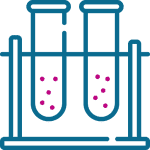Fibrinogen
It is a protein involved in clotting. Once its plasma levels have been determined, further testing for other coagulation indicators may be needed.

It is a protein involved in clotting. Once its plasma levels have been determined, further testing for other coagulation indicators may be needed.
This indicator is used to detect congenital afibrinogenemia (hypofibrinogenemia, dysfibrinogenemia) in suspected cases of DIC syndrome.
Fibrinogen is synthesised by the liver. Increases in blood fibrinogen (in serial tests in the same individual) are a risk factor for cardiovascular pathology (even if these changes are not outside the normal range). Fibrinogen is a physiological substance that has a significant impact on the ENG index. Fibrinogen activity cannot be used to diagnose thrombosis, but can provide a preliminary indication of whether other coagulation tests are needed. Normal fibrinogen levels cannot exclude the risk of thromboembolic complications.
Fibrinogen is involved in blood clotting and in limiting inflammation in the body. The norm for fibrinogen levels in the blood is around 2-4 g/l. An increase in its concentration in the blood may indicate an inflammatory process in the body, or intoxication. Fibrinogen levels are also elevated in the post-operative period after trauma. Significantly elevated concentrations may be present in the presence of tumours or necrotic processes in the body, or in the presence of systemic connective tissue diseases (e.g. lupus). An increase in fibrinogen is an independent risk factor for coronary heart disease, ischaemic stroke.
You can consult our family doctors.



